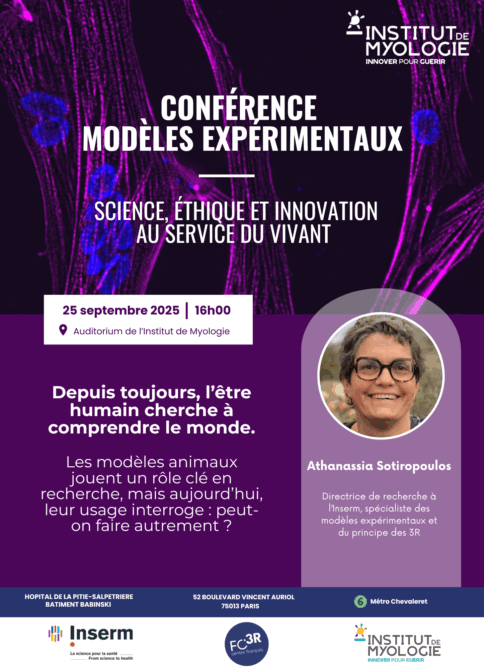REGISTRATION
Free access, in person, upon prior registration (no video conferencing)
As part of its reflections on
Science, ethics and innovation in the field of life,
the Institute of Myology is hosting a lecture in French:
EXPERIMENTAL MODELS IN RESEARCH:
ADVANCES AND ETHICAL ISSUES
by Athanassia Sotiropoulos
Senior researcher,
Head of GIS-FC3R
Thursday 25 September 2025, 4pm
Pitié-Salpêtrière Hospital
Institute of Myology
Auditorium, Babinski building
➣ Background
Experimental models have always been used by human beings to explore their environment. As a complement to studies on tissues and cells, animal models are essential tools enabling biologists to acquire new knowledge about the mechanisms involved in the functioning of living organisms, in order to improve the health of human beings, animals and ecosystems. However, despite their major contributions to progress in biology and medicine, the relevance of animal models is being questioned, particularly in terms of their scientific validity and predictive value. The use of these models also raises questions about the status and welfare of animals.
As an integral part of our civil society, the scientific community began to take an interest in the ethical issues surrounding animal experimentation and the development of alternative methods at the end of the 1950s. It was in 1959 that a consensus was formed around the 3R rule (Replace/Reduce/Refine), which aims to:
- Replace: develop and promote methods to replace the use of animals.
- Reduce: reduce the number of animals required for experiments, while maintaining the robustness of the results obtained.
- Refine: improving methods to reduce the pain, stress and suffering imposed on animals.
This 3Rs philosophy has become a reference framework for the scientific community and has inspired numerous ethical recommendations, as well as regulations and laws aimed at providing a framework for animal experimentation.
➣ The speaker
With the aim of encouraging dialogue and enriching reflection on the scientific, ethical and societal issues surrounding the use of experimental models in research, the Institute of Myology is pleased to welcome Athanassia Sotiropoulos, who will be giving a lecture on these subjects.
Athanassia Sotiropoulos is a senior researcher at the French National Institute of Health and Medical Research (Inserm). Her work focuses on cell signalling and plasticity in skeletal muscle, including neuromuscular physiology, muscle fibre type, transcriptomics, stem cells and exercise training. Since 2021, she has headed the GIS-FC3R scientific interest group, a reference organisation in France for all matters relating to the principles of the 3Rs in animal research. The GIS is actively involved in the development and promotion of the 3Rs through the funding of research projects, the sharing of all scientific results, training and the popularisation of science.
➣ The intervention
Athanassia Sotiropoulos’s presentation will focus on three fundamental themes that explore the issues and advances in her area of expertise:
- Scientific approach and use of models. This first part will lay the theoretical and methodological foundations essential to understanding the subject. Athanassia will review the principles of the scientific approach and explain the importance and application of models (animal and/or alternative) in fundamental and clinical research.
- Changes in experimentation practices. Athanassia will then explore strategies and developments aimed at improving and optimising experimental practices. This part will emphasise the importance of methodological rigour and continuous adaptation to produce more relevant and reliable results.
- Creation of new models. Finally, it will address the crucial aspect of replacing existing models with innovative approaches. This section will focus on the motivations, challenges and prospects associated with the design and validation of new tools for research and clinical trials.
Organising committee: Simone Birnbaum, Frédéric Fer, Julien Mazerie, Olivier Stephan et Nicolas Vignier.
REGISTRATION
Free access, in person, upon prior registration (no video conferencing)

